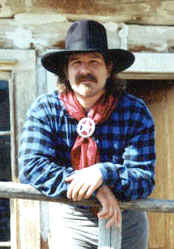Kirby Jonas Learned to Write Western Tough Guys by Being a Tough Guy
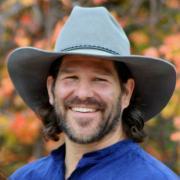
Kirby Jonas, western writer
Hi Kirby Jonas, what great stories. You grew up in the west (with a brief detour), you’ve written fifteen westerns, you were a police officer in Pocatello, Idaho, where you live, you fought forest fires for the Bureau of Land Management in five western states, once worked for the Idaho Fish and Game Department and currently work as a Poncatello city firefighter.
On top of everything else, you’re an artist and paint, or design, your own book covers. (Kirby himself posed for his newest cover).
Q. Was being a police officer good background for DryGulch to Destiny, your recently-released novel about a man hired to tame a lawless town?
A. Yes, it was supreme training for me to write DryGulch to Destiny. So many times I was in similar situations as my “hero,” Matthew Morgan. I once stood in the middle of a street during what amounted to a gang war, with a motorcycle gang on one side of the street and a black gang on the other, both of whom had sworn to kill the others on sight.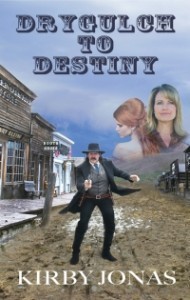
I stood there with only a pistol for protection, and a cadet cowering inside my patrol car to whom I had shown how to get the shotgun out and ready if he had to come to my aid.
Even knowing how badly the motorcycle gang detested cops, I turned and walked into their clubhouse, sort of like a mountain man having to choose between two Indian tribes that were both warlike. The place went as quiet as a tomb, and everyone turned to me in disbelief, standing there with my badge gleaming. When I asked who was in charge, a man suddenly spoke my name and came through the crowd. His name was Michael York–yes, just like the actor. I had once arrested him for domestic battery and taken him to jail.
But he had had an 1866 Winchester rifle at his house–the famous “Yellowboy,” or “Gun that Won the West,” and even though I was arresting him, we struck up a conversation. And because we both had a love for the West, we had an understanding. When I saw Michael there, not having seen him since I left him at the jailhouse, I didn’t know what to expect.
You might imagine the relief that washed through me when he loudly proclaimed to the other thirty or forty gang members there, “Hey, guys, this is a good friend of mine. He’s all right.” And the tension ran out of that room like water as a bunch of rough looking men came to shake my hand.
I was in many fist fights as a cop, several gun standoffs, and many situations where I knew I was going to die but obviously didn’t. So when Matthew Morgan walks into a crowded saloon in DryGulch and is confronted by his worst enemies, believe me, I know what is going through his mind.
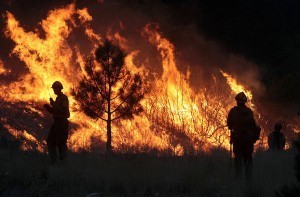 Q. You have fought forest fires, while working for the state, and are now a Pocatello fire fighter. Have you ever fought a fire that threatened your life?
Q. You have fought forest fires, while working for the state, and are now a Pocatello fire fighter. Have you ever fought a fire that threatened your life?
A. I have, unfortunately, fought many fires, mostly wild-land fires, that could easily have taken my life. But probably worse were the lightning storms when we would find ourselves up on some lonely, bald mountain in the middle of the night with lightning striking all around us, so fierce that we had to leave our metal tools far from us and lie down with only a sleeping bag for a shelter as the rain drenched us to the bone.
I have had a load of red fire retardant dropped on me, which has destroyed fire trucks on occasion, and I have lain trying to sleep in old, dead forests where we actually had to prop shovels up against the trees because the wind was so fierce we feared they would topple on us in the night.
There was one house fire, my first, where the chief was a friend of the owners, and he forced us to go into the basement before any ventilation had been performed, before the gas or electricity were shut off, and bare wires were hanging from the celling and sparking. There was ammunition in boxes that was burning and firing off, and honestly, I never thought I would survive that fire. And yes, it will some day be featured in a novel about firefighting–one of those things I survived and now consider one of the greatest gifts a writer can receive.
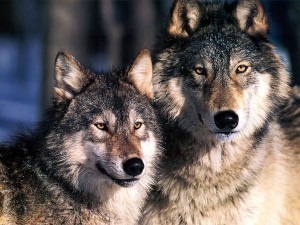
Kirby Jonas believes an uncontrolled wolf population is a “recipe for disaster.”
Q. You’ve said some interesting things regarding wolves to people who want them protected in all circumstances. They seem to feel wolves are noble creatures. I’d like to know your thoughts on that.
A. I believe the wolf is “noble” in some senses of the word. My favorite dictionary is Merriam-Webster, and one of their definitions says “grand or impressive, especially in appearance.” Other definitions can be stretched to fit as well.
Let me talk about the wolf. I love dogs, and I love the appearance of the wolf and the way they symbolize the Old West. The wolf is a loving father, a loving mother. And they are beautiful. Their throaty cries would symbolize, to me, the wilderness, every bit as much as a Canada goose call or the bugle of a bull elk. They are very adept at what they do, and besides frolicking with their family members, what they do is hunt.
That brings me to this truth: Under control, I believe that wolves are a beautiful part of nature. I like knowing they are out there.
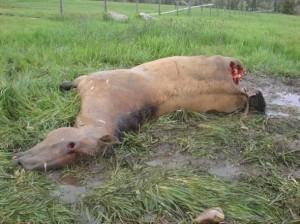
horse killed by wolves
But out of control, which wolves have become, they are a devastating force. They will destroy wolves that wander into their territory, they will destroy wildlife, not only to eat it but to train their young how to hunt, and simply for the pure enjoyment of the chase and the kill. They are no different than any other dog.
They get bored too. Anyone who thinks otherwise has not done their research and is “thinking” with their heart, and not their head.
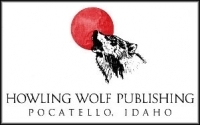 I respect and care about the wolf. My first dog was a wolf, my publishing company is named after wolves: Howling Wolf Publishing. I have sat on a snowy night, unarmed, in the wilderness of Idaho, howling with a pack of wild wolves that could have killed me if they had wanted to.
I respect and care about the wolf. My first dog was a wolf, my publishing company is named after wolves: Howling Wolf Publishing. I have sat on a snowy night, unarmed, in the wilderness of Idaho, howling with a pack of wild wolves that could have killed me if they had wanted to.
But wolves are growing ever braver and more accustomed to people, and they are growing far too numerous, more than the land can handle. It is a recipe for disaster. They have killed thousands of pets and left them lying. They have killed countless thousands of livestock, some to eat, some just for fun.
Wildlife has suffered greatly as well, and anyone who spends time in the mountains as much as I do has seen the carcasses of elk and deer they have killed and torn their entrails out, then left them to rot.
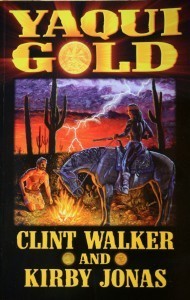 My final say is this: Wolves are a wonderful part of nature, but because we, as humans, have come into upset the balance of nature, they must be managed like any other wildlife species.
My final say is this: Wolves are a wonderful part of nature, but because we, as humans, have come into upset the balance of nature, they must be managed like any other wildlife species.
Q. Can you be more specific?
A. In speaking of “wildlife management,” I mean sensible programs that control their numbers. I mean studies to monitor them carefully to make sure their populations don’t dip too low and also don’t grow too high. It pains some people to think of the “majestic” wolf being shot. It may pain them more to have wolves grow so numerous that their own dog is one day the next victim to fall to their jaws. Or a beautiful horse that is more like a pet.
Those who idolize the wolves need to open their minds and start looking at more in the news than just how wonderful and kind wolves are to their own cubs and mates.
Q. A grizzly attacked one of your characters in Death of an Eagle. That was electrifying. My hair stood on end. How did you research that?
A. Julia, as with anything I write, I delve deeply into my research, as deeply as possible. However, I have had characters shot, and I have neither been shot nor shot anyone else, although as a police officer I came far too close to both. As for the bear attack….. I have a gift I attribute to God for putting myself into any situation I’m writing about. In my head, I live it.
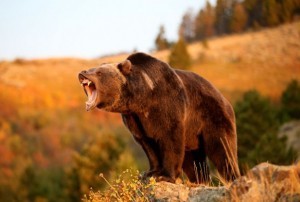
Grizzly bear
I spent hours and hours with our local grizzly bear celebrity at the zoo, watching his actions, taking in his odors, looking into his mouth as he yawned. I watched video interviews with men and women who had been attacked and read countless accounts of the same, both by those who survived and about those who didn’t.
I have stood twenty feet from a very large black bear with a Schrade knife with a six-inch blade, and Jose’s feelings about the grizzly were a magnified version of how I felt facing that big black bear, who outweighed me by at least 200, maybe 300 pounds and could have made short work of me if he had so desired.
Q. Do you hunt? I got the impression you’ve hunted grizzly.
A. I used to hunt. I honestly LIVED for the hunt. I would have horrible nightmares and wake up in a cold sweat because in my dreams I had slept in on opening morning of whatever hunt. I have hunted cottontail rabbits, Arizona javelina, deer, elk, moose, and yes, bear. But not grizzly.
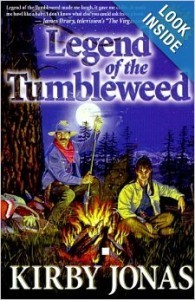 And then, over time, I grew to love wildlife so much that my hunting days just slowly “went away.” I remember an older gentleman telling me that the same thing had happened to him, and I remember my exact feelings. I thought that could never happen to me because it was such a huge part of my life.
And then, over time, I grew to love wildlife so much that my hunting days just slowly “went away.” I remember an older gentleman telling me that the same thing had happened to him, and I remember my exact feelings. I thought that could never happen to me because it was such a huge part of my life.
Then one day, at the same zoo where Charlie the grizzly lived, I got close to a mule deer fawn and put my finger through the chain-link fence–my trigger finger, no less. He began to lick it like a dog. Then the rest of my hand. I was mesmerized. He trusted me so completely, and he was so small and vulnerable. I never went out into the woods the same again, and that was the beginning of the end of hunting for me.
Q. I recently read about a man, a western writer, who believes he lived in the 19th-century west. Do you believe that kind of thing is possible?
A. I have to take a deep breath before I approach this subject. I generally don’t talk about this kind of thing with just anyone. But it has been coming back to me more and more over the last ten years or so, and I have this nagging feeling down deep inside me that perhaps I am missing something important, something my inner self knows and remembers, but my conscious mind does not.
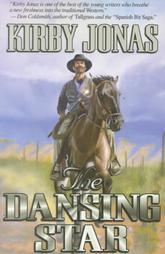 This began when I was writing Death of an Eagle. As you would guess, there is an eagle in this book. A golden eagle named “Golden.” There are other wild eagles mentioned, as there are in almost all of my books, but this is a special eagle that has been wounded by one of the trains my secondary protagonist detests so bad for bringing so-called civilization to his beloved wilderness.
This began when I was writing Death of an Eagle. As you would guess, there is an eagle in this book. A golden eagle named “Golden.” There are other wild eagles mentioned, as there are in almost all of my books, but this is a special eagle that has been wounded by one of the trains my secondary protagonist detests so bad for bringing so-called civilization to his beloved wilderness.
I began to research the golden eagle as I do with everything I write about, and part of my research took place at the same zoo where Charlie lived. There is a golden eagle there, and the first time I came up to study it closely and get to know it, it turned away from where it was to face me.
Now, mind you, there were numerous people around me, but that eagle zeroed in on me. This might seem fanciful, but it was very obviously true. Other people even came over and commented on how she was closely watching me, and only me.
Well, I was mesmerized. I couldn’t move. I was with a group of kindergarteners, including my young son Matthew and luckily my wife was there too, because when they moved on I could not go. I was transfixed.
Every time I have gone to see this eagle since, the feeling has been the same. I have no explanation for this, nor any explanation for how the goose bumps pop out on my skin and my hair stands up and my eyes fill up with tears each and every time I see a golden eagle out in the wild.
I won’t say that I was reincarnated from a golden eagle that lived in the “Old West,” but I will say that there is something there that I have no logical explanation for, a feeling deep inside me that goes far beyond learned schools of thought.
Did I live another life in the Old West? Feeling what I feel inside, I would never insist that this is impossible, even when all conventional teaching might say it is.
Q. Death of an Eagle sold very well. I understand it was a best-seller. But you’ve expressed disappointment book sales have declined. Can you tell us more about that?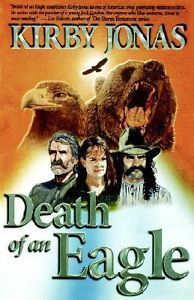
A. First off, I have fifteen books total, the first two out of print and the last three so far only on eBooks with Amazon. But twelve are in paperback.
Julia, my third book, The Dansing Star, started selling like crazy internationally, and I thought I was in heaven. But people who met me kept saying they wanted a book about Idaho–the state in which I now reside. So I wrote Death of an Eagle, another one of those gifts handed me by God, from beginning to end.
I actually lost this story once when my floppy disk went bad after chapter three, but a computer whiz (who was so good that he went to prison later for wrongfully using his computer skills) was able to bring it back and at least print it out, so that I was able to re-type the entire book.
Anyway, apparently all of those people chose to put their money where their mouths were, because it wasn’t long after releasing Death of an Eagle that I found to my astonishment it was the best selling Western in the country. I printed this list out from the Internet, where for just a brief time I was listed above Louis L’Amour, Elmore Leonard, Elmer Kelton, and every other Western writer I revered. I still sometimes have a hard time believing it was real.
The next year, my Legend of the Tumbleweed was the best selling Christmas-release book in the entire northwest for Waldenbooks. That includes some nine states and northern California. It was released about the same time as the new Harry Potter book, and mine beat it for overall sales.
Waldenbooks even hired me to be their keynote speaker at their next managers’ convention.
And then, sadly, Waldenbooks began to decline, as did B. Dalton, my two top sellers, and soon both were gone. Borders went with Waldenbooks, as they were basically one and the same.
And suddenly, in the absence of electronic books, I found the carpet jerked out from under me. Where I had been used to print runs of 5000 at a time, even second print runs, I found myself down to 1000, and I have even contemplated fewer. The world has changed for booksellers. Drastically. I am learning this new world from the ground up.
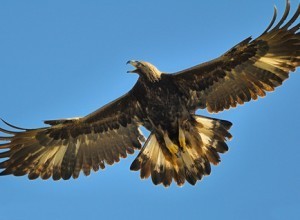
Golden Eagle
But I have regained the hope I once had, and I feel ready for the climb back to the top. Many people have told me that Death of an Eagle is the best Western they have ever read, and four have told me it was their favorite book of all time. I have people who tell me I am their all-time favorite author. How can I let these people down? It isn’t in me.
I have over one hundred more books outlined and just waiting to be written, so although the book selling world has changed, I am going to meet that challenge. I know there is no ceiling for the author who writes a good book and who is willing to adapt to a changing world.
The post Kirby Jonas Learned to Write Western Tough Guys by Being a Tough Guy appeared first on Julia Robb, Novelist.

